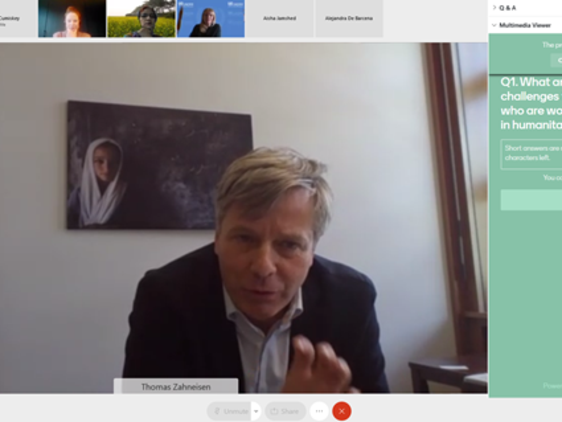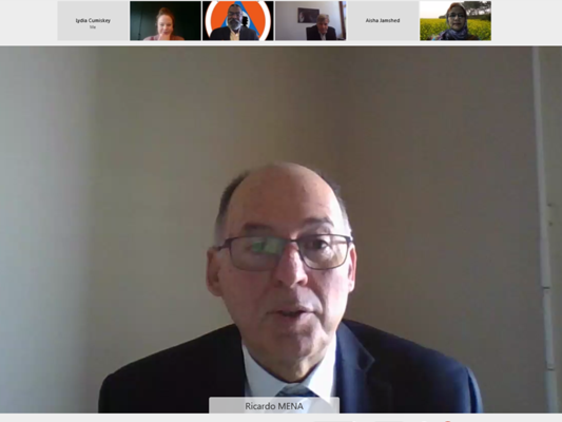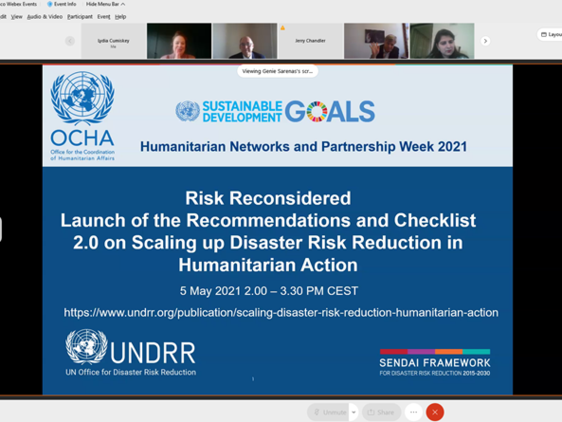Categories
Risk reconsidered – launch of the Recommendations and a Checklist on Scaling up DRR in Humanitarian Action
As part of the Anticipatory Action Priority Topic sessions at the Humanitarian Networks and Partnerships Week, UNDRR organised a session launching the Recommendations and Checklist on Scaling up DRR in Humanitarian Action. These recommendations and supporting checklist outline specific actions to integrate DRR into humanitarian planning and programming at global and country levels. They are designed to help practitioners strengthen risk-informed programming throughout the Humanitarian Programme Cycle, especially in more challenging contexts. The 2.0 edition launched at HNPW was informed by pilot testing in Haiti, Pakistan and Bangladesh, and a global review of DRR in 2021 Humanitarian Needs Overviews (HNOs) and Humanitarian Response Plans (HNPs), undertaken by UNDRR in close collaboration with OCHA and partners.
The launching session at HNPW included an opening presentation by the UNDRR Chief of Intergovernmental processes, Interagency cooperation and Partnerships and opening remarks from the Director of the Coordination Division at OCHA. This was followed by an insightful lineup of high-level speakers who discussed the recommendations and checklist and reflected on their experiences and perspectives on the challenges and opportunities for integrating DRR into humanitarian planning and programming. Speakers included the Country Director of Welthungerhilfe Pakistan, the Director of Humanitarian Assistance at the German Federal Foreign Office, Planning Commission and Director of the National Resilience Programme in Bangladesh, and the Director General for Civil Protection in Haiti.
The importance role of anticipatory action as a solution to bridge DRR and humanitarian planning was emphasised throughout the session. Examples of anticipatory action initiatives being implemented by Welthungerhilfe/ START Network, OCHA, and Red Cross Red Crescent Network were shared. The important role of local actors in owning and driving the process of anticipatory action was highlighted by Ms. Aisha Jamshed from Welthungerhilfe Pakistan and was complemented by Mr. Zahneisen from the German Federal Foreign Office who amplified the importance of investing in developing the capacity of local actors and strengthening long-term sustainable partnerships for anticipatory action. Mr. Zahneisen reaffirmed the commitment of the German government to support in scaling up anticipatory action because they see the benefits in improved efficiency and the reduction of suffering, compared to traditional humanitarian response:
“We have not even tapped into a fraction of the potential of anticipatory action, it needs more financial commitment and we are willing to do that”
Mr. Jerry Chandler, Director-General, Directorate General for Civil Protection, Haiti highlighted the importance of working with all actors to integrate DRR into humanitarian planning. He emphasised the importance of continued coordination and communication with actors across government agencies to enhance their understanding of risk and help them enable risk-informed planning and programming.
Mr. Ricardo Mena, the Director of UNDRR closed the session. He reiterated the importance of collaboration between humanitarian and development actors, and the crucial role of humanitarian actors to identify and implement DRR actions, including scaling up the implementation of anticipatory action initiatives that bridge DRR and humanitarian action:
“Humanitarian actors are well placed to identify DRR actions that can be put in place to reduce risk and strengthen resilience.“
UNDRR explained their next steps to strengthen outreach and uptake of the recommendations and checklist to assist in scaling up DRR in humanitarian action, including designing training packages, developing briefing notes and organising regional events. The Anticipation Hub is committed to supporting any related knowledge sharing and learning activities on anticipatory action to help align efforts between DRR and humanitarian action.
The recording for the session will be available soon via the HNPW website and uploaded here.

Mr. Zahneisen, Director of Humanitarian Assistance from the German Federal Foreign Office

Closing remarks by Mr. Ricardo Mena, Director of UNDRR


Mr. Zahneisen, Director of Humanitarian Assistance from the German Federal Foreign Office
Closing remarks by Mr. Ricardo Mena, Director of UNDRR
